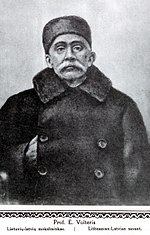Eduards Volters, Date of Birth, Place of Birth, Date of Death
TweetEduards Volters
Baltic German ethnologist, philologist, librarian, archaeologist and ethnographerAbout Eduards Volters
- Eduards Volters (1856–1941) was a linguist, ethnographer, archaeologist who studied in Baltic languages and culture.
- He was a long-time professor at the Saint Petersburg University (1886–1918) and Vytautas Magnus University (1922–1934). Volters, born in Riga, studied linguistics in Germany, present-day Estonia, and Ukraine earning his master's degree in 1883.
- In 1886–1918, he lived in Saint Petersburg where he taught at the Saint Petersburg University and worked as a librarian at the Library of the Russian Academy of Sciences.
- He supported and encouraged Lithuanian and Latvia students joining their cultural activities.
- In 1918, Volters moved to Vilnius and started organizing the Central Library of Lithuania (considered to be the predecessor of the Martynas Mažvydas National Library of Lithuania).
- Due to the Polish–Soviet War, he moved to Kaunas where he lived until his death.
- He established and headed the Central Library (1920–1922), was director of the Kaunas City Museum (1922–1936), and taught various courses at the Vytautas Magnus University (1922–1934). Volters' interests were varied – linguistics, ethnology, folklore, archaeology.
- He was a prolific writer and authored more than 400 articles in Lithuanian, Latvian, German, Russian, though much or his collected material remains unpublished.
- In 1883–1887, he organized expeditions to collect ethnographic data and folklore examples in Lithuania and Latvia.
- In 1908–1909, Volters made the first audio recordings of Lithuanian folk songs.
- In total, Volters and his assistants collected some 1,000 fairy tales, 300 songs, and 2,000 examples of riddles, proverbs, jokes, etc.
- He prepared and published methodologies and instructions on how to collect ethnographic data to preserve accuracy and authenticity.
- Initially supportive of the Lithuanian press ban, Volters soon became its critic and managed to get a few Lithuanian publications approved and published for academic purposes, including the reprint of the Catechism, or Education Obligatory to Every Christian by Mikalojus Daukša in 1884.
- He published a statistical work on the inhabited localities in the Suwalki Governorate in 1901 and had similar works planned for the Kovno and Vilna Governorates.
- He also carried out or supervised several archaeological excavations – various tumuli in 1888–1889, Apuole hill fort and tumulus in 1928–1931, Kaunas Castle in 1930 and 1932.
Read more at Wikipedia
See Also
- Famous People's Birthdays on 06 March, Latvia
- Famous People's Birthdays in March, Latvia
- Famous People's Birthdays on 06 March, Lithuania
- Famous People's Birthdays in March, Lithuania
- Famous librarian's Birthdays on 06 March, Latvia
- Famous librarian's Birthdays in March, Latvia
- Famous ethnologist's Birthdays on 06 March, Latvia
- Famous ethnologist's Birthdays in March, Latvia
- Famous archaeologist's Birthdays on 06 March, Latvia
- Famous archaeologist's Birthdays in March, Latvia
- Famous ethnographer's Birthdays on 06 March, Latvia
- Famous ethnographer's Birthdays in March, Latvia
- Famous philologist's Birthdays on 06 March, Latvia
- Famous philologist's Birthdays in March, Latvia
- Famous librarian's Birthdays on 06 March, Lithuania
- Famous librarian's Birthdays in March, Lithuania
- Famous ethnologist's Birthdays on 06 March, Lithuania
- Famous ethnologist's Birthdays in March, Lithuania


 Date of Birth:
Date of Birth:  Place of Birth: Riga, Latvia
Place of Birth: Riga, Latvia